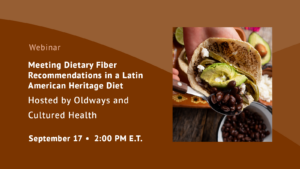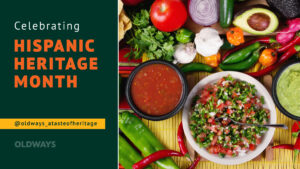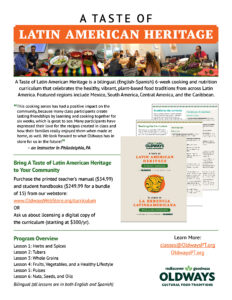 Let’s celebrate National Hispanic Heritage Month together! From September 15th to October 15th, we honor the history, culture, and traditions of Americans with Hispanic roots. At Oldways, we’re marking the occasion with what we do best – delicious food!
Let’s celebrate National Hispanic Heritage Month together! From September 15th to October 15th, we honor the history, culture, and traditions of Americans with Hispanic roots. At Oldways, we’re marking the occasion with what we do best – delicious food!
Throughout this special time, we’re highlighting the influence that Hispanic Heritage has had on shaping the ingredients and flavors we love across the U.S. From different types of cuisines to everyday favorites, staples like Yuca, Curtido, Tomatillo, Arepas, Plantains, Tamarind, and a variety of spices (all with Latin American origins!) are a cherished part of the American food scene.
From an Oldways’ Latin American Heritage Advisor Robert Graham, MD, MPH, Chef: “When it comes to our health, it all starts with food but in the end, what we truly want in life is to be happy.”
But our celebration is more than just enjoying delicious dishes. It’s about promoting chefs, historians, dietitians, food business owners, and home cooks of heritage. It’s a reminder that we embrace Latin American culture and traditions all year round to raise awareness about the positive impact of Oldways Latin American Heritage Diet. Doing so can help reduce health inequities in the Latin American community and improve health and wellness for Americans of all backgrounds.
Ways that We’re Celebrating this Month
Join us on Instagram this month for live conversations with our Latin American Heritage and Health Advisory Committee Members:
 Professor Steven Alvarez October 9th at 3 pm
Professor Steven Alvarez October 9th at 3 pm
Dr. Steven Alvarez, a member of the Oldways Latin American Heritage Program Advisory Board, is an expert in literacy studies and bilingual education. As Assistant Chair of the English Department at St. John’s College, he has been on the faculty since 2017. With a Ph.D. from The Graduate Center, CUNY, he focuses on Mexican immigrant literacy and foodways, notably through his course “Taco Literacy.” An accomplished author, his works include Brokering Tareas and The Codex Mojaodicus. We look forward to discussing his latest (September 2024) published poetry novel!
 Steve Velasquez, National Museum of American History curator, September 24th at 3 pm ET
Steve Velasquez, National Museum of American History curator, September 24th at 3 pm ET
L. Stephen Velasquez is a Curator at the National Museum of American History. His notable exhibitions include Food: Transforming the American Table 1950-2000, Many Voices, One Nation, and Entertainment Nation. He is researching Mexican vineyard workers in Napa and working on an exhibit about lowrider car culture. His past projects include Bittersweet Harvest, Mexican Treasures, and AZUCAR! He has a master’s in Anthropology from The George Washington University and a bachelor’s from the University of Missouri.
 Dr. Robert Graham September 24th at 2:30 pm ET
Dr. Robert Graham September 24th at 2:30 pm ET
Dr. Robert E. Graham, MD, MPH, is a Harvard-trained physician and researcher, board-certified in Internal and Integrative Medicine, with expertise in Holistic and Functional Medicine. The son of an El Salvadorian immigrant, he has spent nearly 20 years advancing health equity and integrative healthcare, focusing on minority communities. His NYC-based FRESH Medicine practice promotes a holistic approach through the “FRESH 5″—Food, Relaxation, Exercise, Sleep, and Happiness. As one of the few doctor/chefs globally, he excels in culinary medicine, teaching healthcare professionals about whole food, plant-based meals and designing medically tailored meals.
Q&A’s with our Latin American Heritage Advisory Committee
 We’re excited to welcome Krista Linares, MPH, RD to our Oldways Latin American Heritage Advisory Committee. As the founder of Nutrition con Sabor, Krista integrates Latin American heritage foods into nutrition practices, emphasizing their cultural and nutritional value.
We’re excited to welcome Krista Linares, MPH, RD to our Oldways Latin American Heritage Advisory Committee. As the founder of Nutrition con Sabor, Krista integrates Latin American heritage foods into nutrition practices, emphasizing their cultural and nutritional value.
Learn more about Krista in our recent Q&A blog, along with Dr. Steven Alvarez.
Read Q&A with Krista
Read Q&A with Steven
Join us for a webinar on September 17th
 Join us for a webinar on “Meeting Dietary Fiber Recommendations in a Latin American Heritage Diet,” where we’ll explore how to boost fiber intake through traditional foods. Discover insights from top dietitians Rebeca Stevenson, RDN, LDN, who will discuss legumes in Latin American diets, and Sylvia Klinger, DBA, MS, RDN, who will address whole grains and debunk myths about these foods. This session will equip you to help patients increase fiber consumption while embracing Latin American cuisine.
Join us for a webinar on “Meeting Dietary Fiber Recommendations in a Latin American Heritage Diet,” where we’ll explore how to boost fiber intake through traditional foods. Discover insights from top dietitians Rebeca Stevenson, RDN, LDN, who will discuss legumes in Latin American diets, and Sylvia Klinger, DBA, MS, RDN, who will address whole grains and debunk myths about these foods. This session will equip you to help patients increase fiber consumption while embracing Latin American cuisine.
Learn about the Oldways “A Taste of Latin American Heritage” curriculum
The Latin American Heritage Diet promotes richly flavorful, affordable, and easy-to-prepare foods and reflects this vast area’s fantastic range of culinary traditions, nutrition, and flavors. Variations have traditionally existed in the parts of Latin America where maize (corn), potatoes, peanuts, and beans are grown, including modern-day Mexico and the other countries in Central and South America. This eating pattern blends the broad traditional diets of four significant cultures: the indigenous people (Aztecs, Incas, Mayans, and other Native Americans), the Spanish, Portuguese, and continental Africans.
Browse Oldways’ recipe collection to bring the flavors of the Latin American Heritage Diet into your own home kitchen. Or become an instructor!
Join us on Instagram to Celebrate with Us and help Spread the Word
All month long, we will be featuring delicious recipes from our Latin American Heritage calendar alongside information about the amazing nutritional benefits of the Latin American Heritage Diet. To join us, follow us on Instagram at @Oldways_PT and @Oldways_atasteofheritage. We feature informational videos and recipe how-to’s each week hosted on our Instagram accounts.
 Happy National Hispanic Heritage Month!
Happy National Hispanic Heritage Month!
Check out our new ingredient swap graphic, please feel free to download and share on social media #OldwaysHeritage #ATOLAH








Leave a comment